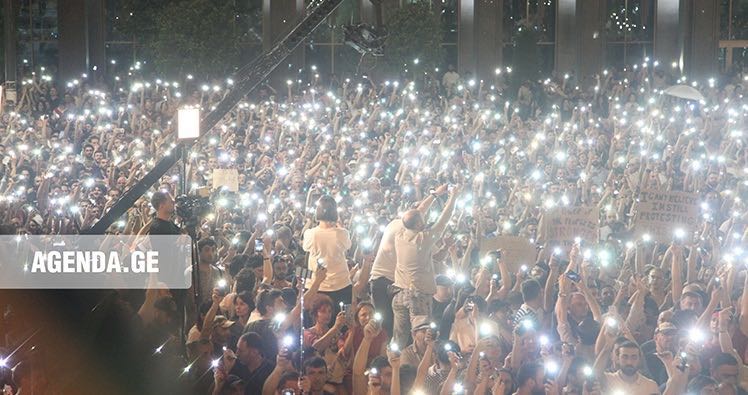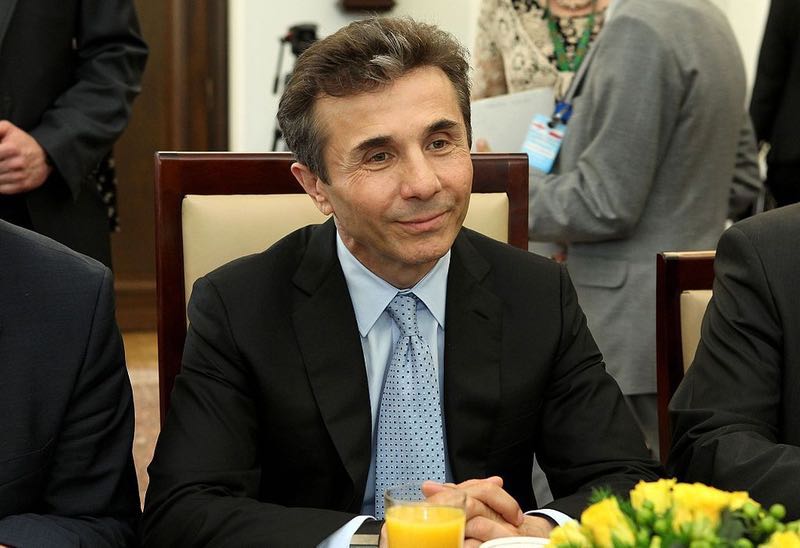On June 20 a Russian parliamentarian addressed the Georgian parliament in Russian, while seated in the chair of the speaker of the House. That day thousands took to the streets, protesting the Russian occupation of 20% of Georgian territory in 2008. In retaliation against this 'Russophobia', Putin cancelled tourist flights to Georgia. But the anger in Tbilisi is not all about Russia, says Caucasus expert Thomas de Waal on Carnegie Moscow. The Georgian Dream government is increasingly unpopular with large segments of the population.

by Thomas de Waal
Georgia is an angry democracy. A recent Gallup survey found that 27 percent of Georgians said they felt angry 'yesterday'. That is more than enough to bring large numbers of protestors out onto Rustaveli Avenue, Tbilisi’s traditional arena of protest.
Russians may be surprised at how quickly and violently events unfolded in the Georgian capital in response to the appearance of one Russian Duma deputy in the parliament. After all, on a people-to-people level, relations between the two countries have improved markedly since the 2008 war. One million Russian tourists visited Georgia last year.
This does not reckon with how feelings of anger and humiliation towards the Russian state have persisted since 2008. Had Sergei Gavrilov been an ordinary participant in the parliamentary session on June 20, he would probably have got away it. Yet the sight of him sitting in the speaker’s chair — 'occupying' the speaker’s chair — in the parliament chamber was genuinely offensive to many Georgians
Protest against Russia also sign of political strife
On June 20 Russian parliamentary Sergei Gavrilov, member of a political delegation of Orthodox countries, addressed parliament in Tbilisi in Russian, seated in the chair of the speaker of the House. He is a staunch supporter of the de facto annexation of Abkhasia and South Ossetia, invaded by Russia during the 5-day war in 2008.
Thousands took to the streets against this act of Russian 'arrogance'. The speaker resigned and the government gave in to one of the demands of the protesters: parliamentary elections in 2020 will be held under a proportional electoral system.
Clashes with the police were violent. 240 people were injured, many had rubber bullet wounds, 2 people lost their eye sight.
Putin subsequently banned tourist flights to Georgia, a very popular destination for Russian tourists.
The same Georgian can welcome a Russian tourist to his shop or vineyard but categorically reject any restoration of diplomatic relations with Moscow while Russian troops remain in Abkhazia and South Ossetia. In other words, improving people-to-people relations have stabilized the relationship between the two countries, but cannot resolve the deep political differences.
Georgian Dream flopped
The anger is not all about Russia, however. The Georgian Dream government is increasingly unpopular with large segments of the population. The urban professional classes in Tbilisi resent the shadowy unaccountable figures who are running the country from behind the scenes. The popularity rating of the godfather of Georgian Dream, Bidzina Ivanishvili, has dropped sharply in recent times and the man who was hailed as a savior in 2012 is now the most 'negatively viewed' politician in Georgia.
 Bidzina Ivanishvili, leader of the Georgian Dream (picture Wikipedia)
Bidzina Ivanishvili, leader of the Georgian Dream (picture Wikipedia)
Ivanishvili is clever enough and Georgia has enough of a democratic culture to heed calls for change. So the man who should have been sitting in the speaker’s chair on June 20, Irakli Kobakhidze, has paid the price for this error of judgment and resigned. Never a popular politician, Kobakhidze is the ritual sacrifice Georgian Dream party makes for its mistakes.
Yet, the anger always spills out on the streets. There are some political forces in Georgia who want to force regime change from the street and are looking for pretexts to do it. Former president Mikheil Saakashvili urged his supporters to come out on the streets yesterday. He still has a loyal television channel Rustavi-2 to broadcast his message. A small number of these protestors made maximalist demands — the resignation of the whole government — and some of them tried to storm the parliament building.
Polarized politics
This points to a persistent weakness of Georgia. Its politics is so polarized that there is no single leader who can speak for the whole nation. Formerly, in some circumstances, Patriarch Ilya II could fulfil that role, but the 86-year-old church leader now lacks the physical strength to do so. The big names — nominal head of state President Salome Zurabishvili, behind-the-scenes leader Bidzina Ivanishvili, former leader Saakashvili — are all engaged in aggressive rhetoric that divides and does not unite.
Instead, as before Georgians are looking to make change in political life from the street, from one specific street — Rustaveli Avenue. In 1956, 1978, 1989, 1991, 2003, 2007 and 2012 and again in the last days, Rustaveli has been the stage-set for political drama, sometimes bloody, sometimes peaceful.
It is unfortunate that, despite having built democratic institutions, Georgia is still resolving its disputes in this way. A decade ago, the Georgian author Guram Odisharia wrote: 'Without the emergence of a new political culture, without a harmonic relationship between the authorities and society, the people’s hopes will always be deceived and the main player in our country’s political history will be Rustaveli Avenue and not Georgian politicians.'
The same unfortunate scenario played out again in Tbilisi in the last couple of days.
